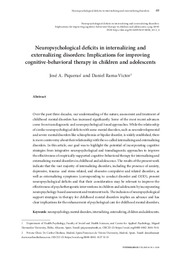Por favor, use este identificador para citar o enlazar este ítem:
https://hdl.handle.net/11000/36077Registro completo de metadatos
| Campo DC | Valor | Lengua/Idioma |
|---|---|---|
| dc.contributor.author | Piqueras, Jose A | - |
| dc.contributor.author | Rama Víctor, Daniel | - |
| dc.contributor.other | Departamentos de la UMH::Psicología de la Salud | es_ES |
| dc.date.accessioned | 2025-03-24T08:15:03Z | - |
| dc.date.available | 2025-03-24T08:15:03Z | - |
| dc.date.created | 2020 | - |
| dc.identifier.citation | PSYCHOLOGICA, VOLUME 63 Nº 2 • 2020 | es_ES |
| dc.identifier.issn | 1647-8606 | - |
| dc.identifier.issn | 0871-4657 | - |
| dc.identifier.uri | https://hdl.handle.net/11000/36077 | - |
| dc.description.abstract | Over the past three decades, our understanding of the nature, assessment and treatment of childhood mental disorders has increased significantly. Some of the most recent advances come from transdiagnostic and neuropsychological-based approaches. While the relationship of similar neuropsychological deficits with some mental disorders, such as neurodevelopmental and severe mental disorders like schizophrenia or bipolar disorder, is widely established, there is more controversy about their relationship with the so-called internalizing and externalizing disorders. In this article, our goal was to highlight the potential of incorporating cognitive strategies from integrative neuropsychological and transdiagnostic approaches to improve the effectiveness of empirically-supported cognitive-behavioral therapy for internalizing and externalizing mental disorders in childhood and adolescence. The results of the present work indicate that the vast majority of internalizing disorders, including the presence of anxiety, depressive, trauma- and stress-related, and obsessive-compulsive and related disorders, as well as externalizing symptoms (corresponding to conduct disorder and ODD), present neuropsychological deficits and that their consideration may be relevant to improve the effectiveness of psychotherapeutic interventions in children and adolescents by incorporating neuropsychology-based assessment and treatment tools. The inclusion of neuropsychological support strategies in therapy for childhood mental disorders implies an advance and has clear implications for the enhancement of psychological care for childhood mental disorders. | es_ES |
| dc.description.abstract | Ao longo das últimas três décadas, a nossa compreensão da natureza, avaliação e tratamento das perturbações mentais na infância aumentou significativamente. Alguns dos avanços mais recentes derivam de abordagens transdiagnósticas e neuropsicológicas. Embora a relação de défices neuropsicológicos com algumas perturbações mentais, como as perturbações neurodesenvolvimentais e perturbações mentais graves, como a esquizofrenia e a perturbação bipolar, seja amplamente reconhecida, existe maior controvérsia acerca da sua relação com as perturbações internalizantes e externalizantes. Este artigo teve como objetivo destacar o potencial de incorporar estratégias cognitivas derivadas de abordagens transdiagnósticas neuropsicológicas integradoras para aumentar a eficácia de tratamentos cognitivo-comportamentais empiricamente validados para perturbações internalizantes e externalizantes na infância e na adolescência. Os resultados do presente trabalho indicam que tanto a vasta maioria de perturbações internalizantes (incluindo perturbações de ansiedade, perturbações depressivas, perturbações relacionadas com trauma e fatores de stress, e perturbações obsessivo-compulsivas e relacionadas) como perturbações externalizantes (como perturbação do comportamento e perturbação desafiante de oposição), apresentam défices neuropsicológicos, e que a consideração destes défices pode ser relevante para melhorar a eficácia de intervenções psicoterapêuticas com crianças e adolescentes, incorporando ferramentas neuropsicológicas de avaliação e tratamento. A inclusão de estratégias neuropsicológicas de suporte na intervenção terapêutica para as perturbações mentais infantis implica um avanço e tem implicações claras na melhoria de cuidados psicológicos a esta população. | es_ES |
| dc.format | application/pdf | es_ES |
| dc.format.extent | 24 | es_ES |
| dc.language.iso | eng | es_ES |
| dc.publisher | Imprensa da Universidade de Coimbra | es_ES |
| dc.rights | info:eu-repo/semantics/openAccess | es_ES |
| dc.rights | Attribution-NonCommercial-NoDerivatives 4.0 Internacional | * |
| dc.rights.uri | http://creativecommons.org/licenses/by-nc-nd/4.0/ | * |
| dc.subject | neuropsychology | es_ES |
| dc.subject | mental disorders | es_ES |
| dc.subject | internalizing | es_ES |
| dc.subject | externalizing | es_ES |
| dc.subject | children and adolescents | es_ES |
| dc.subject | neuropsicologia | es_ES |
| dc.subject | perturbações mentais | es_ES |
| dc.subject | internalizantes | es_ES |
| dc.subject | externalizantes | es_ES |
| dc.subject | crianças e adolescentes | es_ES |
| dc.subject.other | CDU::1 - Filosofía y psicología::159.9 - Psicología | es_ES |
| dc.title | Neuropsychological deficits in internalizing and externalizing disorders: Implications for improving cognitive-behavioral therapy in children and adolescents | es_ES |
| dc.type | info:eu-repo/semantics/article | es_ES |
| dc.relation.publisherversion | https://doi.org/10.14195/1647-8606_63-2_4 | es_ES |

Ver/Abrir:
2020_131_Investigacion_Publicaciones_NeuropsychologicalDeficits.pdf
668,88 kB
Adobe PDF
Compartir:
 La licencia se describe como: Atribución-NonComercial-NoDerivada 4.0 Internacional.
La licencia se describe como: Atribución-NonComercial-NoDerivada 4.0 Internacional.
.png)